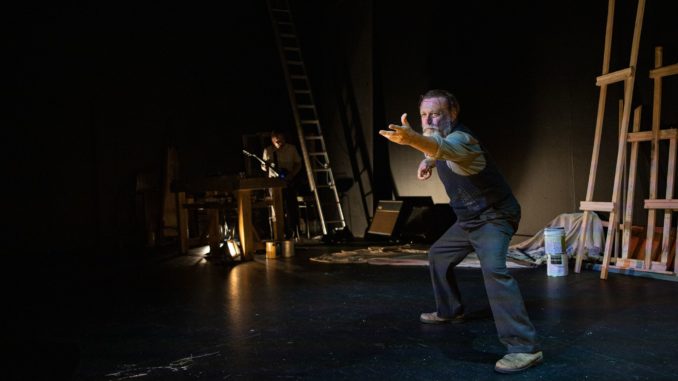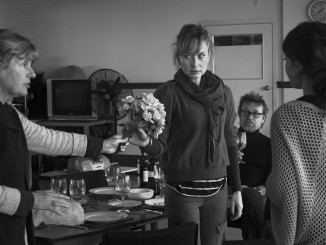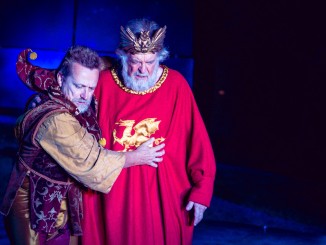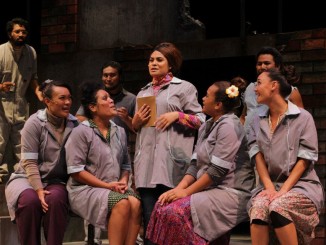
[I have Wept with Hecuba and Raged with Achilles]
Standing on the ramparts of Troy we look out to sea, across the furrowed stretch of land between city and sand littered with bodies – the bodies of men and boys, mostly boys that we once knew – to the angry cluster of Greek ships; above us, the gods bicker.
In this liminal space stands Michael Hurst, the weary Poet. He has one foot in the ancient world of the gods, and one foot in present day Aotearoa. He turns first towards the city of Troy and then to the Greek camp on that bitter beach. The Poet tells us early on that every time he sings the song of this terrible and miserable war that he hopes it will be the last time.
Happily for us, Hurst will sing this song several more times. I am going to say it outright -you absolutely should go see An Iliad. If you don’t know the Iliad, go to see an incredible story masterfully and poetically told. And if you are familiar with it, go to see the epic brought earth-shatteringly into contact with the present. An Iliad not only makes Homer’s text accessible to all audiences but makes the song distressingly relevant.
The song, as told by Hurst, is buoyed along by the musical offerings of Shayne P Carter who, as the Muse, at times leads the action by releasing from his guitar throbbing and uncanny notes which probe their way into the corners of the Herald Theatre like spears of sound, piercing through flesh and armour alike. At other times, he simply underpins the action with trickling, whispery melodies. These melodies come as echoes of the many pools and fountains of the once calm sanctuary of Troy rippling across the vast expanse of time.
As a musician myself, I am often contentedly ‘distracted’ by the presence of live music in theatrical works but Carter seems so comfortable and the music so naturally responsive to the text that between this consummate ease and Hurst’s complete and magnetic embodiment of the world I find myself forgetting that the Muse is there at all until some climatic tone comes searing through a battle scene.
Bright as a flame and taut as a bowstring, Hurst flickers between many characters, male and female alike. I would say it is effortless but the show runs at 110 minutes and swiftly the toll of Hurst’s highly physical performance shows in a film of sweat. His dark sweater vest and slacks steadily become darker and darker with perspiration. I admire this tenacious costume decision as much as I admire the utter control Hurst has over every fibre of his being.
I am loath to ‘spoil’ the show in any way – both for those who are intimately acquainted with Homer and for whom it is all new – as this Iliad is so fresh and vital. I must however make particular mention of Hurst’s phenomenally beautiful delivery of the occasional line in Greek. A particularly profound moment is when he becomes queen Hecuba gazing down at her dead and dishonoured son, Hector. A wordless cry of utter anguish travels from the depths of Hurst’s body and tumbles out reformed into Greek – a mother’s broken heart spoken in the most ancient of tongues, needing no translation.
The poet begins the show with several invocations to the muses, and we come to understand that a Greek relationship between poet and muse is one of dependence: the poet needing the muse to speak to him and through him in order to access these memories, to recount these events. Watching Hurst and Carter in An Iliad is to feel not only the presence of the muses but to witness the gods; to hear the voices of the long dead, to see a world entirely lost to us, and yet to completely understand that this story is a story we are repeating today and have repeated over and over again. To watch An Iliad is to glance into the mirror and see that the face of humanity has not changed.
An Illiad plays at the Herald Theatre until 9th June.
Starring Michael Hurst as the Poet and Shayne P Carter as the Muse.
Directed by Jonathon Hendry, and presented by Auckland Live and Artsense Productions.
Created by Lisa Peterson and Denis O’Hare.
Based on Homer’s Iliad, translated by Robert Fagles.




Leave a Reply